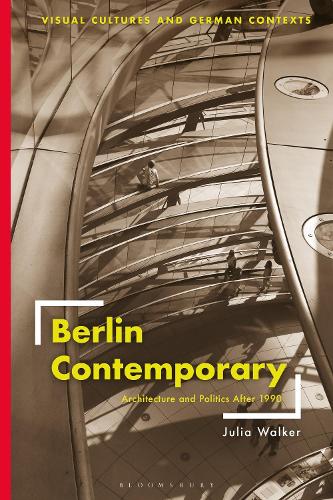
Berlin Contemporary: Architecture and Politics After 1990
(Paperback)
Publishing Details
Berlin Contemporary: Architecture and Politics After 1990
By (Author) Professor Julia Walker
Bloomsbury Publishing PLC
Bloomsbury Visual Arts
27th June 2024
United Kingdom
Classifications
Tertiary Education
Non Fiction
City and town planning: architectural aspects
725.10943155
Physical Properties
Paperback
264
Width 150mm, Height 228mm, Spine 18mm
400g
Description
For years following reunification, Berlin was the largest construction site in Europe, with striking new architecture proliferating throughout the city in the 1990s and early 2000s. Among the most visible and the most contested of the new projects were those designed for the national government and its related functions. Berlin Contemporary explores these buildings and plans, tracing their antecedents while also situating their iconic forms and influential designers within the spectacular world of global contemporary architecture. Close studies of these sites, including the Reichstag, the Chancellery, and the reconstruction of the Berlin Stadtschloss (now known as the Humboldt Forum), demonstrate the complexity of Berlins political and architectural rebuildingand reveal the intricate historical negotiations that architecture was summoned to perform.
Reviews
Walker writes about contemporary architecture not as a critic but as a sharp-eyed, thought-provoking historian. Berlin Contemporary is a meticulously researched book that raises the bar for the study of recent urbanism; Walkers luscious, flowing prose makes for effortless reading, despite the seriousness of the subject. A formidable achievement. * Carla Yanni, Distinguished Professor of Art History, Rutgers, The State University of New Jersey, USA *
A deeply researched book on a city that has, in the course of its reconstruction, arguably become the cultural capital of Europe, Berlin Contemporary grapples with issues of architecture, politics, the public sphere, and memory that have implications for cities around the world. * Elizabeth Otto, Professor of Modern & Contemporary Art History, State University of New York at Buffalo, USA *
The words Reunification of Germany seem to indicate a singular event. In reality, it is hardly a done deal even today. Approaching the topic in a way that is both sensitive and provocative, Walkers book, interblending history and criticism, helps us see how architecture operates within complex political, geo-political, and cultural environments. * Mark Jarzombek, Professor of the History & Theory of Architecture, Massachusetts Institute of Technology, USA *
Author Bio
Julia Walker is Associate Professor of Art History at The State University of New York in Binghamton, USA. Her research focuses on modern and contemporary architecture, emphasizing the persistence and transformation of modernist ideas within contemporary practiceand the ways in which this modernist inheritance informs, inflects, and destabilizes claims to political meaning. Her current projects examine the underrepresentation of women in architectural practice and explore the history of architectural criticism as a genre.
